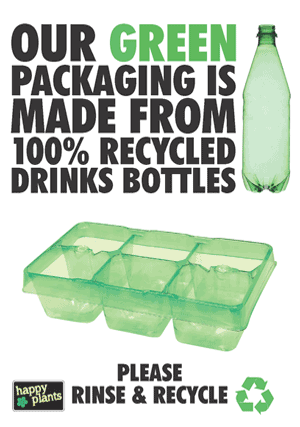Delegates at last week’s sell-out Sustainability Matters conference organised by the HTA were left in no doubt about the challenges businesses face as climate change and environmental issues rise to the top of the agenda – but the day was also sprinkled with positive messages about the significant strides retailers and growers have already made.
HTA president-elect Boyd Douglas-Davies (Hillview garden centre group), who described the event as “the most exciting, intense, stimulating event I have ever been to”, said the conference not only reminded the industry what still needed to be done but had underlined a ‘can do’ attitude. “You can do it,” he said, summing up, urging the industry to take a lead and not wait for the government to impose “nonsense” solutions. “Let’s tell Defra how to do it…...We have a lot going for us. We are producing a great product that allows people to grow, pick and eat something with no food packaging….Let’s make sure the gardeners of the future are coming to us an industry of great British growers and independent retailers – people who know what we’re doing and have the future mapped out.”
The issue of the industry’s use of plastic was clearly going to be a major topic and was the subject of a lively panel debate. The refusal of most local authorities to accept plastic plant pots for kerbside re-cycling drew criticism. Other than pots containing the carbon black pigment, which cannot be detected by the scanners that sort waste, plant pots CAN be re-cycled but are ruled out because they require washing, among other reasons. Natalie Porter of Porters Fuchsias/Happy Plants felt councils should stop making excuses and change their advice to exclude only carbon-black pots to help reduce the UK’s estimated 500 million plastic pot mountain.
The HTA-backed initiative to encourage growers to supply plants in taupe-coloured plastic pots (which can be picked up by scanners), currently supplied by Modiform, was highlighted as a major step forward – but there was no consensus for industry-wide adoption of taupe as the standard in an independent retail sector that prides itself on points of difference.
 For Porters, blue and green are the colours…as Natalie Porter explained, plants are now supplied in blue pots manufactured by Poppelman and pack bedding is supplied in clear green PET packs made from 100% recycled drinks bottles which can be returned to food grade packaging when themselves recycled, while Porters’ trays are made from recyclable paper pulp.
For Porters, blue and green are the colours…as Natalie Porter explained, plants are now supplied in blue pots manufactured by Poppelman and pack bedding is supplied in clear green PET packs made from 100% recycled drinks bottles which can be returned to food grade packaging when themselves recycled, while Porters’ trays are made from recyclable paper pulp.
The drive towards meeting the government’s target for eliminating the use of peat in growing media was highlighted by Steve Harper, head of commercial and marketing at Bord na Mona, as an example of the horticultural industry’s progressive response to a challenge that was originally about biodiversity but is now about carbon emissions. By the end of the year, the Responsible Sourcing Scheme for Growing Media will have produced a calculator that will allow suppliers to “score” their raw materials on a sustainability matrix. While it will be free for all to use, suppliers who sign up can access the proposed audit scheme, which will help to push the quality benchmark across the sector.
Mike Burks, MD of The Garden Group, stressed the importance of taking a positive approach when communicating with customers on environmental issues. He believed taking back packaging was one example of “the right thing to do”. His centres also engage with with their local communities in encouraging wildlife gardening and growing plants to attract pollinators.
These and other topics discussed on the day will be covered in greater depth in the June print issue of Garden Trade News.